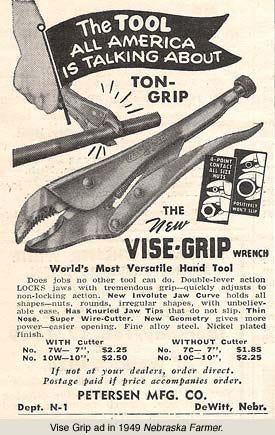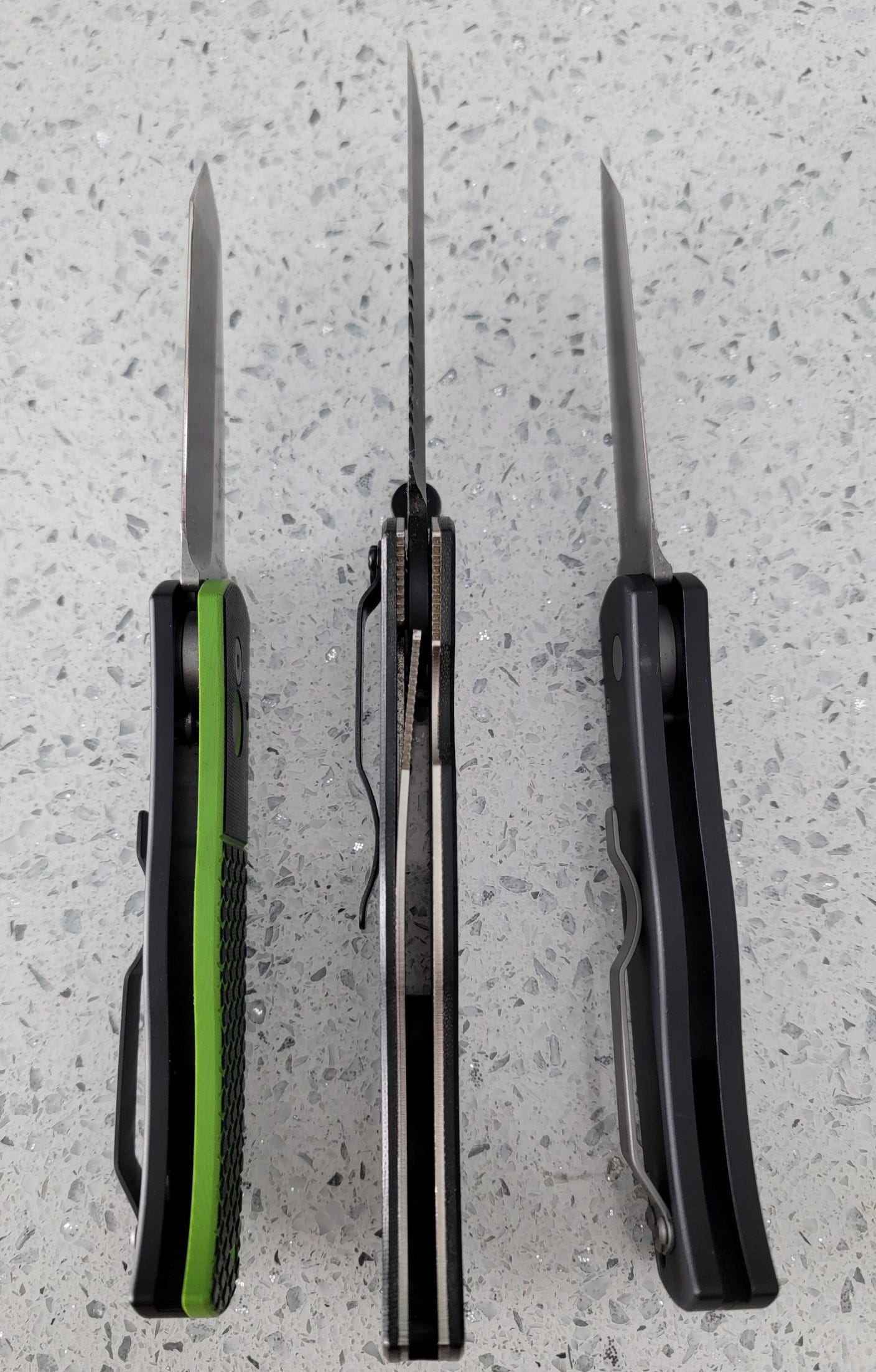Made In The USA: Pro-Tech
As always, these are free to read in their entirety
One entirely legitimate criticism I hear of my “Made In The USA” series, now more than seven years old, is that I tend to focus on high-priced, boutique-ish products, be they fifty-dollar Malco locking pliers or fifty-dollar bath towels. I wish I could say that criticism is incorrect. It’s not just that I have a preference for “nice stuff”, although I do. Paying a fair wage in US dollars and complying with our nightmare nest of environmental, safety, and social justice regulations is expensive.
Truthfully, it’s been that way for more than a century. The United States hasn’t been a low-cost manufacturer since the early Industrial Age. In 1949, Petersen charged $2.50 for ten-inch locking pliers:
Gold was forty bucks at the time. It’s now $1,750 or thereabouts. Apply that same escalation to Vise-Grips and you get $92 a set, which is what Snap-On charges for their Malcos but twice what ACF readers are paying Summit or Amazon. (For a different perspective, the minimum wage was forty cents, which suggests that the current “Fight for 15” is historically correct when compared to gold prices.)
So it’s not that American-made items are any expensive than they once were. It’s more that we took a series of societal actions that somehow managed to simultaneously eviscerate our buying power while also increasing our desire for consumer products. (I know my readers will differ on what those actions were, but I would heretically suggest the biggest driver of this was all but compelling American women to work out of the house, which doubled the number of available workers for many jobs without doubling the demand for their associated output.)
It therefore gives me great pleasure to talk about an American-made product that is better than it used to be, with more features, while also being much cheaper. Here’s the story: When I was younger, the folding knives made by Ernest Emerson were a BIG DEAL, largely because they were associated in the public mind with the Navy SEALs. Depending on whom you believe, Emerson either wouldn’t compromise quality to increase production or he was a total headcase flake whose output was always as spotty as a forty-something career girl with a Mirena, (I am so sorry for that joke) but either way there was a lot of unsatisfied demand for the "CQC” folder.
That demand was filled in 1995 or thereabouts with the Emerson-licensed Benchmade 970 and 975 series of knives. I bought the alpha dog of that series, the blackout-coated, partially-serrated, extra-long 975SBT, in 1996. As I recall it was $249 plus shipping and tax and a long wait. Might have been $299, even. I’d just spent $299 on a perfect-condition matte-stainless Colt King Cobra revolver, and I can recall viewing my purchase in that context.
(Side note: That King Cobra was a piece of junk. I’d hoped for Python fluidity, because it was a Colt, or GP100 durability, because it looked like a Ruger. Instead I got a Trooper revolver that somehow managed to combine cardboard-shelter durability with a double-action trigger pull not unlike pulling a weighted sled across a quarry debris field containing surprising variants of rock size along the way. However, I did made an outstanding trade deal to get rid of it, taking advantage of a man’s literal Nazi sympathies — but that’s a story for another time.)
I promptly bent the blade doing a variation of my infamous phone book test, after which I sent it in for warranty service. By the time the knife was back with a replacement blade, I was busy with other stuff so I let it sit in a drawer for twenty-five years and essentially forgot about it.
A perfect 975SBT is now worth perhaps nine hundred bucks on eBay, which is ironic because Emerson himself is now having a CQC7 made for just $213 in a similar grade of steel. That’s a deal if you ask me. Not everyone trusts Emerson or his workmanship, however — which is fine, because there’s an even better deal out there.
Pro-Tech Knives in California will sell you an automatic version of the Emerson — what kids call a “switchblade” for $240. It’s the same 154CM grade of steel used by Emerson, but Pro-Tech has an impeccable reputation for workmanship and execution. Some of you may know Pro-Tech as the manufacturer of “magic” switchblades, which use a variety of recherche mechanisms to deploy. They’re brilliant if you live somewhere automatic knives are illegal or highly disliked; one of my more prominent readers gave my son a Magic Pro-Tech a while back and he has been absolutely fascinated by it since.
The Pro-Tech Emerson is more forthright about its intentions, offering a simple button to deploy. Here’s one of mine, the $225 (even CHEAPER!) KnifeJoy collaboration version, in super slo-mo. Actual opening time is almost faster than the eye can catch — you’ll see what Bruce Dickinson called a “flash of the blade” and then it will be open.
The spring is so strong it will shake your wrist when the blade deploys — no worries that it won’t pop-and-lock when you call it into action. It’s a considerably simpler mechanism than what you’d find in a double-action out-the-front automatic like a Microtech, EOS, or Benchmade Infidel, and perhaps for that reason I’d trust it more. Of course, if the spring breaks you can still open and lock it manually.
I’ve put a couple of Pro-Techs next to my 27-year-old Benchmade for scale and proportion. Note that the 975SBT is larger than the Emerson original, and larger than the current crop of Emersons, which perhaps accounts for some of its continued cult status. Which lock is stronger: the Benchmade liner lock or the Pro-Tech button? We’re gonna test that! Just kidding. I assume they’re both plenty strong, and I know from personal experience that the Benchmade will bend a blade before the lock gives in.
Note, also, that Benchmade reversed the 975SBT clip for “tip-down” carry. It also carries “deeper” in the pocket, but that’s something you can address on the Pro-Techs with a LynchNW deep-carry clip.
It’s a wonder to me how Pro-Tech stays in business. The boutique Chinese knives like WE/CIVIVI charge just about the same money for non-automatics using the same grades of blade and handle. The mechanism is rock-solid and clearly machined with care but it doesn’t really cost any more than an Emerson flipper. Did I mention that Pro-Tech also makes a zillion different variants and special editions, like the lime-green KJ above, and that many of them don’t cost a penny more than the standard item?
If you live in one of those states where it’s probably de facto legal to steal $800 of stuff from a store and/or set a cop car on fire, but it is not legal to use an automatic knife to open up a robber package, Pro-Tech will happily sell you a manual opener or a “spring-assisted” knife like the Kershaw Ken Onion models.
(Side note, not entirely unrelated to the above paragraph: Target just told investors that they expect to have an additional $600 million in shoplifting loss this year, with New York City being perhaps the most intensely-looted part of the company’s public footprint. I have two immediate reactions to this. The first one is:

The second is that $600M of Target retail is probably what, $50M actually paid to their Chinese manufacturing partners? What’s the real cost of this $110 lamp? Ten bucks? When a mentally ill company that spends much of its corporate attention trying to reshape the moral state of America loses a few bucks in overseas trash, who could possibly care, other than the lizard investors? The funniest part of this is that I used to know the head of loss prevention at a Columbus, Ohio Target. He was a six-three, 230-pound blond monster athlete who liked to play “bounce ball”. You see, company policy was that you couldn’t pursue the shoplifters past the red concrete balls at the store entrance, so he would let them run out the door then forcibly shove them from behind into the red ball, at which point they would bounce back with a broken bone or two and he’d hold them down for the cops. This was in 2007. How times have changed. Today he’d be in jail — but he’s actually in Germany doing corporate security.)
The Pro-Techs are so good I don’t really see any need for my old Benchmade. I don’t think you need it either, but if you do I’m happy to sell it to Substack subscribers for $399. If you’re a Trackday Club member you can have it for $299 shipped. I suggest you let me hold onto the flipper Benchmade and pull the trigger on a Pro-Tech instead. It’s American-made and, in the current pygmy dollars, a better value than ever!







I’m sitting in a deer blind in northern WI with a Buck 110 and a Buck 691T, both proudly made in the USA. 110 was a gift from my hunting mentor but is around $60; 691T was maybe $95. Not as many features as those automatic blades, but I’m less worried about quick action when gutting a deer. For quick action I’ve also got a USA made S&W M&P 2.0 9mm here with me, and a made in the USA Savage 110 in .30-06. None of this stuff is fancy, exotic, or impressive to anyone, but all is durable, and should last me basically forever, and I’m glad to have it.
Since I harbor no fantasies about defending my life with a small pocket knife (I have a S&W Shield for that), I carry a knife that is a bit more utilitarian and cheap. Opinel #8 is available on Amazon for $18. Yeah, not made in USA, but is made in France. Light weight, good edge, easier to sharpen. You don't need to spend hundreds on a knife. Hell, the number of times I've either lost one, or dropped it over the edge of the boat, I'd shit myself for spending that kinda money.
That said, I do appreciate the made in USA features, but yeah, you still talk about stuff way more expensive than most people are willing to spend. And yes, I recently spent several hundred per knife for a good kitchen set - Wustoff from Germany. As long as they stay in the kitchen, not much chance of losing them.
Since you brought up the old versus new minimum wage, one thing to remember is back then people didn't have multiple TV's, cable/satellite/internet service, dozens of video subscription services, hundreds (if not more) in cell phone bills, etc. and so forth. We make more money (relatively speaking) but choose to spend it faster on all the above such that we really aren't richer than our parents, just more easily entertained.